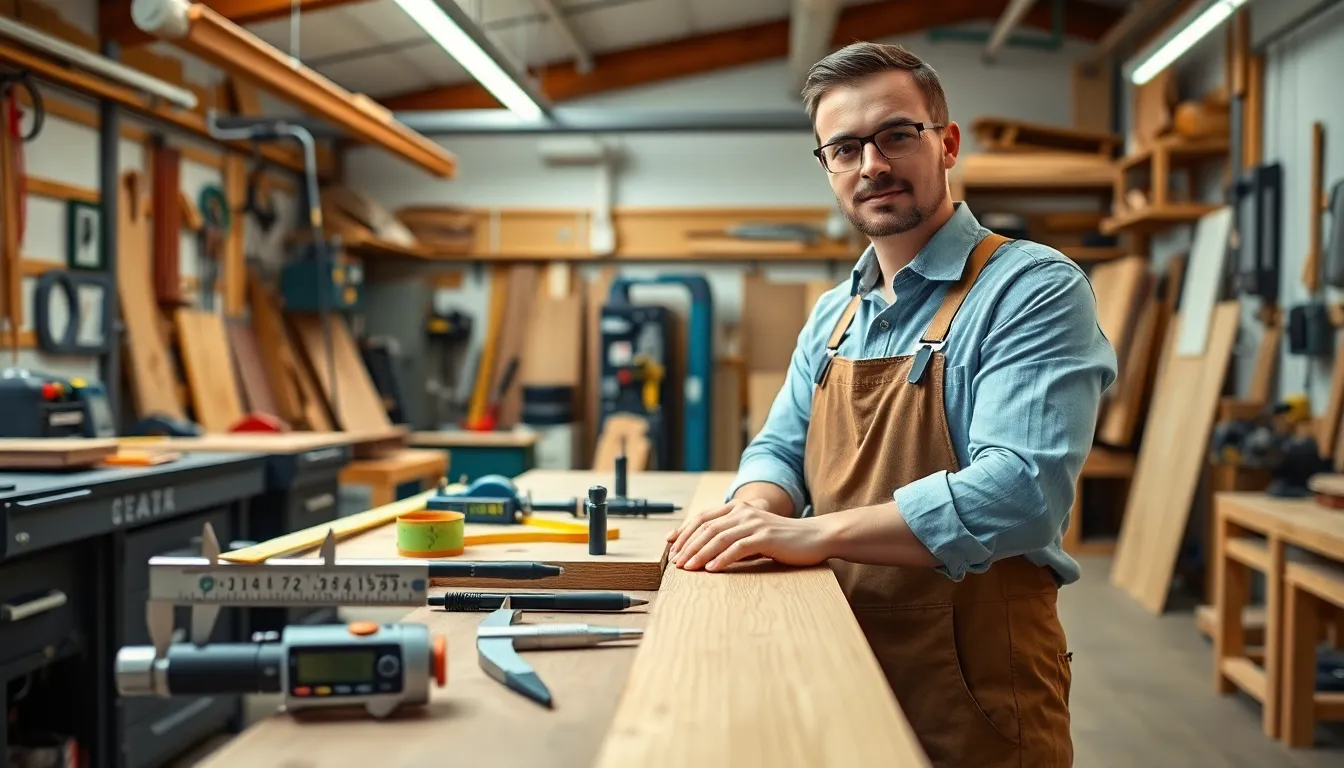Every workshop has its own unique ecosystem, where creativity thrives amid the chaos of sawdust and scattered tools. But let’s face it—navigating that clutter can feel like a game of dodgeball with a particularly aggressive paint can. Enter the unsung heroes of the workshop: cleaning tools. These trusty sidekicks not only keep the workspace tidy but also help maintain that all-important flow of inspiration.
Imagine wielding a broom like a lightsaber, banishing dust bunnies with each sweep. Or picture a vacuum that doesn’t just suck up debris but also your worries about tripping over a rogue wrench. With the right cleaning tools, a workshop transforms from a battlefield of disorder into a sanctuary of creativity. Let’s dive into the must-have tools that’ll make cleaning less of a chore and more of an adventure.
Table of Contents
ToggleOverview of Cleaning Tools for Workshop
Cleaning tools play a vital role in workshop maintenance and productivity. An organized space enhances creativity and ensures safety while working.
Importance of Cleanliness in the Workshop
Cleanliness in a workshop directly impacts efficiency and safety. A tidy environment reduces the risk of accidents caused by clutter. An organized workspace fosters creativity and allows materials to be easily accessible. Regular cleaning also extends the lifespan of tools and equipment, minimizing replacement costs. Workers who maintain a clean area often experience increased focus and motivation. Prioritizing cleanliness supports a professional atmosphere and demonstrates respect for the craft.
Types of Cleaning Tools Available
A diverse range of cleaning tools exists to address various workshop needs. Brooms are essential for sweeping debris and dust from floors. Vacuums effectively remove fine particles and prevent respiratory issues. Dust cloths and microfiber towels are ideal for wiping down surfaces. Trash bins help organize waste materials and promote recycling efforts. Mops are necessary for keeping floors spotless, especially after spills. Additionally, brushes assist with cleaning small, detailed areas. Using the right cleaning tools ensures efficient maintenance and a pleasant workspace.
Essential Cleaning Tools for Workshop

Maintaining a clean workshop is crucial for efficiency and safety. A variety of cleaning tools simplify this task effectively.
Brooms and Brushes
Brooms are fundamental for sweeping up large debris and dust from the workshop floor. Different types of brooms, such as push brooms and angled brooms, cater to specific cleaning needs. Brushes serve as excellent tools for scrubbing surfaces, removing stubborn dirt or paint. Selecting the right bristle type, such as stiff or soft, enhances effectiveness. Regularly using these tools prevents dirt accumulation and maintains a safer environment.
Vacuums and Dust Extractors
Vacuums are indispensable in any workshop for quickly removing fine dust and debris. Industrial vacuums offer powerful suction capabilities, making them ideal for heavy-duty use. Dust extractors connect to power tools, capturing dust at the source while working. This preventive approach keeps the air cleaner and reduces health risks. Investing in these vacuum systems leads to a significant improvement in overall workshop hygiene.
Cloths and Rags
Cloths and rags are essential for wiping down surfaces and tools. Microfiber cloths attract dust and debris effectively, reducing the need for chemical cleaners. Disposable rags offer convenience for quick cleanups and messes. Storing these cloths conveniently promotes regular use, ensuring a consistently clean workshop space. By incorporating these items into daily cleaning routines, workers enhance their work environment significantly.
Specialized Cleaning Tools
Specialized cleaning tools enhance the efficiency and effectiveness of workshop maintenance. Their diverse applications ensure a clean and functional workspace.
Chemical Cleaners and Solvents
Chemical cleaners and solvents play a critical role in tackling tough stains and grease. Heavy-duty degreasers handle machinery residue, while glass cleaners ensure transparent surfaces. Many products come in aerosol forms, providing easy application on vertical surfaces. It’s essential to choose cleaners that suit specific materials to avoid damage. Workshop surfaces, including metal and plastic, benefit from well-formulated solutions. Proper ventilation during use protects respiratory health and maintains a safe environment.
Scrapers and Putty Knives
Scrapers and putty knives are indispensable for removing stubborn materials. Metal scrapers penetrate tough grime and paint, while plastic options protect delicate surfaces from scratches. Both types feature various blade widths for different tasks, from broad areas to precise details. Users often find that a sturdy handle improves grip and control during intricate jobs. Maintaining scrapers involves regular cleaning to ensure longevity and reliability. Effective use includes a combination of pushing and pulling motions to eliminate debris efficiently.
Pressure Washers
Pressure washers provide powerful cleaning capabilities for larger workshop areas. High-pressure water jets effectively remove dirt and debris from surfaces like driveways, patios, and machinery. Various nozzle attachments allow for adjusting water flow and pressure to suit different cleaning needs. Many models from reputable brands offer electric or gas-powered options. Choosing the right pressure washer depends on the scale of tasks, with PSI ratings indicating strength levels. Regular maintenance, such as checking hoses and nozzles, ensures optimal performance and extends equipment life.
Tips for Maintaining Cleaning Tools
Maintaining cleaning tools ensures long-lasting performance and efficiency in any workshop. Regular attention to these tools leads to better cleanliness and organization.
Proper Storage Techniques
Store brooms and brushes upright to prevent warping and bristle damage. Keep vacuums in a dry, cool area to avoid moisture buildup that can damage electrical components. Use dedicated racks for hanging mops and cloths, promoting air circulation and preventing mildew. Compressing rags into a container can help keep them clean and organized. Label storage areas to easily identify cleaning supplies, simplifying the process of finding tools when needed.
Regular Maintenance Routines
Inspect cleaning tools periodically for wear and tear, addressing issues like frayed bristles or clogged vacuum filters. Clean cloths and rags regularly to maintain cleanliness and effectiveness during use. Empty trash bins frequently to avoid odors and pest attraction. Vacuum filters require replacement according to manufacturer’s guidelines to sustain suction power. Incorporate deep cleaning schedules for specialized tools, ensuring optimal performance and longevity.
Investing in the right cleaning tools is essential for any workshop. These tools not only enhance the workspace’s appearance but also boost productivity and safety. A clean workshop fosters creativity and ensures that materials are easily accessible.
Regular maintenance and proper storage of these tools can prolong their lifespan and effectiveness. By incorporating a variety of cleaning options, from brooms to specialized cleaners, individuals can create a more enjoyable and efficient cleaning process. Ultimately, a well-maintained workshop leads to a more inspiring environment, encouraging creativity and focus.


